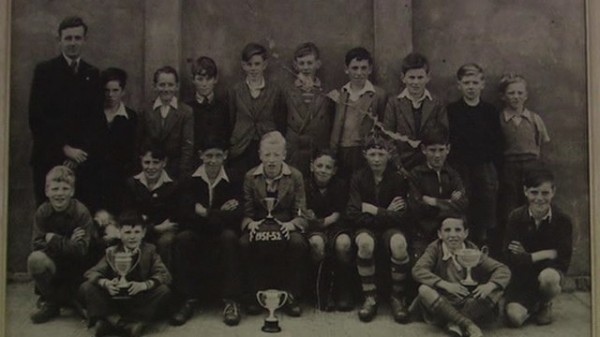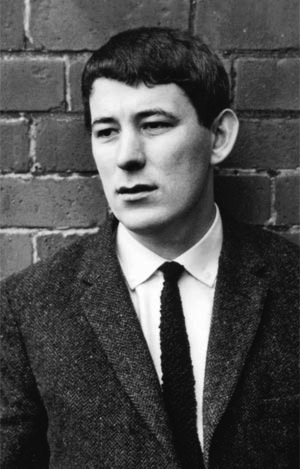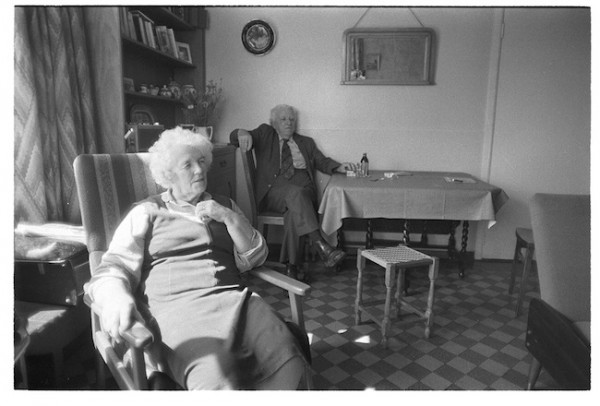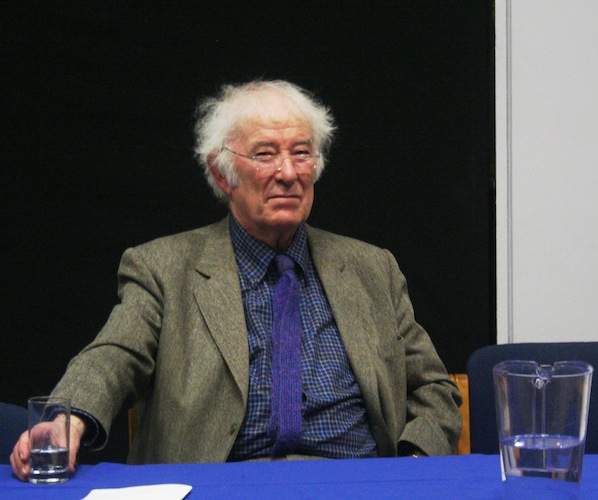Poetry Appreciation: Seamus Heaney — “You’ll know them if I can get them true”
Throughout his writing, poet Seamus Heaney’s penetrating imagination is one that strives for accuracy.

Anahorish Primary School Football Team, 1951. Seamus Heaney, last row, third boy from left, with tie.
By Marcia Karp
The first poem in Seamus Heaney’s first book (“Digging” in Death of a Naturalist, 1966) has been much spoken of since Heaney’s death, August 30, 2013. It is an accomplished and confident poem, read these past months as a proclamation of intent. It opens
Between my finger and my thumb
The squat pen rests; snug as a gun.
The writing narrator hears first, as poets are said to do, then sees, his father at work, digging potatoes through the years. And sees, too, his father’s father dig in bog turf. The respect Heaney will bestow throughout his long writing life on the mastery of others is part of this poem’s texture and given in sure declaration at the poem’s mid-point.
By God, the old man could handle a spade.
Just like his old man.
From the start, Heaney’s poems reveal a life lived comfortably in its own specificity. “Digging” disparages neither Ireland’s guns nor the familial spades as it stakes out its own life’s work in its final lines.
Between my finger and my thumb
The squat pen rests.
I’ll dig with it.
There is a small dig right in those lines. The prediction and self-pact of the last one would fit naturally on the second line, taking the same place “snug as a gun” does in the opening. Yet it is set off, not only rendering sureness, but resting as a superfluous line in the symmetrical poem. It becomes the somewhere a young man draws the line between the lives before him and his own.
Heaney, though, had separated himself, or allowed himself to be separated, from his family well before the poem was written. He received such good marks on the 11-plus exam – still being given in Northern Ireland when Heaney was in his last year at the Anahorish Primary School – that he was offered a scholarship to board at St. Columb’s College, a Roman Catholic school, in Derry City. (On the day of his death, the BBC re-posted a 2007 video of Heaney’s visit to Anahorish.) The 40-mile bus ride to St. Columb’s appears in “Boarders,” collected with other pieces under the title “Found Prose” (District and Circle, 2006); “Mid-Term Break” (1966) tells of a now well-known trip home from there. Heaney’s Nobel page quotes his saying that going to the school was a move from “the earth of farm labour to the heaven of education.”
His imagination here, as throughout his writing, is one that strives for accuracy: “The very ‘there-you-are-and-where-are-you?’ // Of poetry itself.” (“Electric Light,” Electric Light, 2001). His comparison of earth and heaven does not betray the lives of his family. Rather than the more extreme hell / heaven contrast, he stays with the factual and makes a truer metaphor. Betrayal does, though, hover around such a change of circumstances. “Keeping Going,” dedicated to his brother Hugh, who remained a farmer, includes what must be the voice of their mother, given the familiar trick of it by this, Heaney’s ninth volume, and given the ensuing domesticity:
‘Don’t go near bad boys
In that college that you’re bound for. Do you hear me?
Do you hear me speaking to you? Don’t forget!’
And then the potstick quickening the gruel …
[The Spirit Level, 1996]
College here means St. Columb’s, a private secondary school. That college puts it in its place. The boy grown into a man doesn’t forget where he is from. He doesn’t forget what happens on a farm. He ends the poem with a memory of the family’s old barn door and the whitewash brush the poem introduces as both farm implement and childhood thing of imagination. The final words, addressed to Hugh, begin with a pun that, like others in Heaney’s work, brings life to idiom, and truth to a life. In this case, a life in which epilepsy can reverse the usual order of things:
I see you at the end of your tether sometimes,
In the milking parlour, holding yourself up
Between two cows until your turn goes past,
Then coming to in the smell of dung again
And wondering, is this all? As it was
In the beginning, is now and shall be?
Then rubbing your eyes and seeing our old brush
Up on the byre door, and keeping going.
The farm (dung and byre) and the church (As it was / In the beginning …) lend their voices to the language of education, which, as much as the company of bad boys does, threatens betrayal. Though Heaney gives us, in “The Flight Path” (The Spirit Level, 1996), a tree whose language is purely its own – “The sycamore speaks in sycamore from darkness” – he knows that humans beg, borrow, and steal theirs, even when they don’t want to. Here is the fourth sonnet of the “Clearances” series, dedicated to his mother a few years following her death:
Fear of affectation made her affect
Inadequacy whenever it came to
Pronouncing words ‘beyond her’. Bertold Brek.
She’d manage something hampered and askew
Every time, as if she might betray
The hampered and inadequate by too
Well-adjusted a vocabulary.
With more challenge than pride, she’d tell me, ‘You
Know all them things.’ So I governed my tongue
In front of her, a genuinely well-
adjusted adequate betrayal
Of what I knew better. I’d naw and aye
And decently relapse into the wrong
Grammar which kept us allied and at bay.
[The Haw Lantern, 1987]
Betray, the poem reminds us, is not only to be disloyal, but also to reveal. As when she affects to being less than she is so as to be relieved from an inner change of affecting to be more, or when the disdain in that college and them things is loud and clear. The poem ends with a line break that betrays three things entangled in the last two lines: a relapse into the wrong; a (wrong) grammar that joins and separates mother and son; the fact that he makes a relapse, even if a decent one (one akin to the mother’s something hampered and askew), makes them each ally and enemy, baying at each other, each in a hard-won and mongrel language.
The mother declines a Well-adjusted vocabulary; the son commits a well- / adjusted turn away from his own. Heaney is not a poet whose cleverness demands notice, yet he is clever. Though she stumbles away from it, Mrs. Heaney’s is a proper, capital-lettered, all-of-a-piece adjective. His own is not only lower-cased, but the breaking at the line calls up the many poems where the family pump plays its part and is a place of fascination for the young boy.
As a child, they could not keep me from wells
And old pumps
[“Personal Helicon,” 1966]
His ability to adjust to his family’s ways was learned at the well.
It is interesting to see when the poems were published, and so to get some limits as to dates of composition. Yet, Heaney, who shares with Alexander Pope early poetic maturity, shows himself be a poet whose subject matter does not consign his work to recognizable periods. Not only does his special combination of vocabularies reflect the combination of experiences in “Digging,” poems in every volume (see the title poem, “Death of a Naturalist,” for starters) demonstrate the results of the origin myth here.
Making Strange
I stood between them,
the one with his travelled intelligence
and tawny containment,
his speech like the twang of a bowstring,
and another, unshorn and bewildered
in the tubs of his wellingtons,
smiling at me for help,
faced with this stranger I’d brought him.
Then a cunning middle voice
came out of the field across the road
saying, ‘Be adept and be dialect,
tell of this wind coming past the zinc hut,
call me sweetbriar after the rain
or snowberries cooled in the fog.
But love the cut of this travelled one
and call me also the cornfield of Boaz.
Go beyond what’s reliable
in all that keeps pleading and pleading,
these eyes and puddles and stones,
and recollect how bold you were
when I visited you first
with departures you cannot go back on.’
A chaffinch flicked from an ash and next thing
I found myself driving the stranger
through my own country, adept
at dialect, reciting my pride
in all that I knew, that began to make strange
at that same recitation.
[Station Island, 1985]
The I of the poem begins between two men and their worlds. The first, a man at ease with himself; the second, another, made wild and in need by the sound and sense of the first man’s speech. Because the first is admiringly described, and the second is trusting and understood – because both of their worlds are also his, the man in the middle is in a muddle. The cunning middle voice, not only clever, but beloved, speaking in a grammar of its own – Be adept and be dialect – offers a way out of it by suggesting that, though he must estrange himself from what and those he loves, he can take with him whatever he wants from those things and people.
The poem doesn’t present Keats’s understanding of the cornfield of Boaz, where Ruth “sick for home” stands “in tears amid the alien corn.” Here, the field shares a sentence with a love for the stranger and reminds us that it is also the place where Ruth’s need is met with generosity, and her loyalty with respect. It is the ground from which Ruth makes her way to a good life. The speaker, too, has to make a way for himself. (A maker? In Greek ποιητής, poiētēs.)
The comforting and advising voice stops. The speaker sees something and is moved, really, by it.
A chaffinch flicked from an ash and next thing
I found myself driving the stranger
The coinciding of the bird’s tail movement with its location – flicked from an ash – is one way the speaker can now combine the two worlds – a local, treed bird moving its tail and a sudden illusion of a cigarette-flicking sophisticate. Then follows a moment of ecstasy, at least of philosophical ecstasy, when, next thing, he finds himself outside himself. The line break enforces sense of the necessary self-discovery.
and next thing
I found myself driving the stranger
But that, too, passes, in the larger reconciliation, spoken now not in a wrong, but in a new grammar:
and next thing
I found myself driving the stranger
through my own country, adept
at dialect, reciting my pride
in all that I knew, that began to make strange
at that same recitation.
Unknown. Found. Recognized. Made strange by the poet’s art. The simultaneous discovery of something and the recognition that the something is already known is part of Heaney’s method; it is hard to read any of his collections and not encounter it. Here it is in his final volume.
On the hoarding and the signposts
“Lough Neagh Fishermen’s Co-operative,”
But ever on our lips and at the weir
“The eelworks.”
[“Eelworks,” Human Chain, 2006]
In fact, he sets himself the task of revealing what is known, as it had been revealed to him. The first passage below is set upon return from a visit to Thomas Hardy’s first home. The second is the second of two poems under the title, “Mossbawn: Two Poems in Dedication.” Mossbawn is the name of the Heaney family farm, his own first home. The dedicatee is his mother. The poem is a challenge by the writer to himself that he create art that is particular in its truths, and reeking of such humanity that anyone with ears to hear, and eyes, of course, to see, will recognize us in all our anonymities.
We come back emptied,
to nourish and resist
the words of coming to rest;
birthplace, roofbeam, whitewash,
flagstone, hearth,
like unstacked iron weights
afloat among galaxies.
Still, was it thirty years ago
I read until first light
for the first time, to finish
The Return of the Native?
The corncrake in the aftergrass
verified himself, and I heard
roosters and dogs, the very same
as if he had written them.
[“The Birthplace,” Station Island]
They seem hundreds of years away. Brueghel,
You’ll know them if I can get them true.
[“The Seed Cutters,” North, 1975]
Here’s one final poem by which to remember or discover Seamus Heaney, for whom saying what he shouldn’t have might just end up – if it is truth – being not such a bad thing.
An Ulster Twilight
The bare bulb, a scatter of nails,
Shelved timber, glinting chisels:
In a shed of corrugated iron
Eric Dawson stoops to his plane
At five o’clock on a Christmas Eve.
Carpenter’s pencil next, the spoke-shave,
Fretsaw, auger, rasp and awl,
A rub with a rag of linseed oil.
A mile away it was taking shape,
The hulk of a toy battleship,
As waterbuckets iced and frost
Hardened the quiet on roof and post.
Where is he now?
There were fifteen years between us two
That night I strained to hear the bells
Of a sleigh of the mind and heard him pedal
Into our lane, get off at the gable,
Steady his Raleigh bicycle
Against the whitewash, stand to make sure
The house was quiet, knock at the door
And hand his parcel to a peering woman:
‘I suppose you thought I was never coming.’
Eric, tonight I saw it all
Like shadows on your workshop wall,
Smelled wood shavings under the bench,
Weighed the cold steel monkey-wrench
In my soft hand, then stood at the road
To watch your wavering tail-light fade
And knew that if we met again
In an Ulster twilight we would begin
And end whatever we might say
In a speech all toys and carpentry,
A doorstep courtesy to shun
Your father’s uniform and gun,
But – now that I have said it out –
Maybe none the worse for that.
[Station Island]
Marcia Karp has poems and translations in Free Inquiry, Oxford Magazine, The Times Literary Supplement, The Warwick Review, Ploughshares, Harvard Review, Agenda, Literary Imagination, Seneca Review, The Guardian, The Republic of Letters, and Partisan Review. Her work is included in these anthologies: Penguin Books’ Catullus in English and Petrarch in English; Joining Music with Reason: 34 Poets, British and American, Oxford 2004-2009 (Waywiser); and The Word Exchange: Anglo-Saxon Poems in Translation (Norton).



